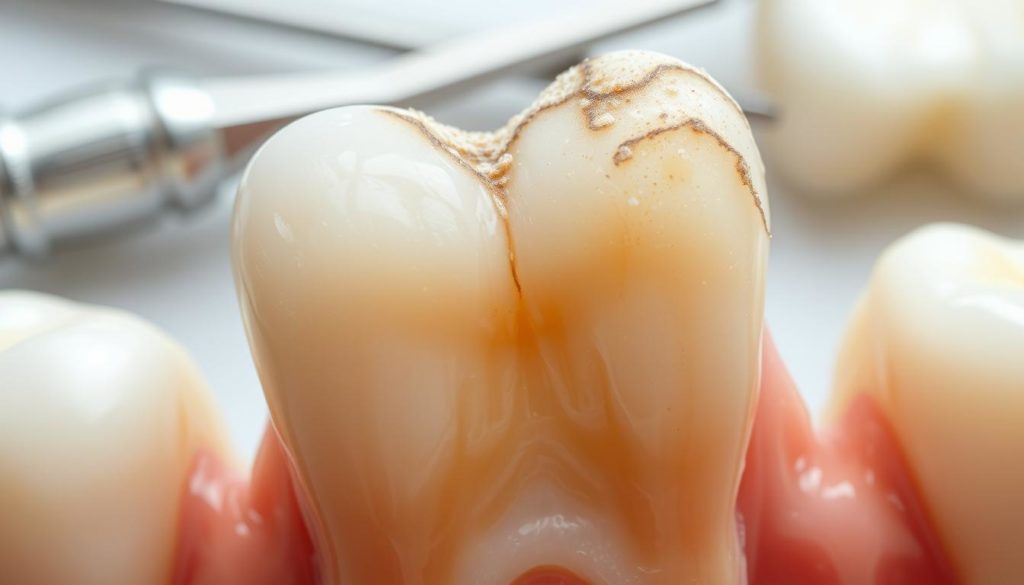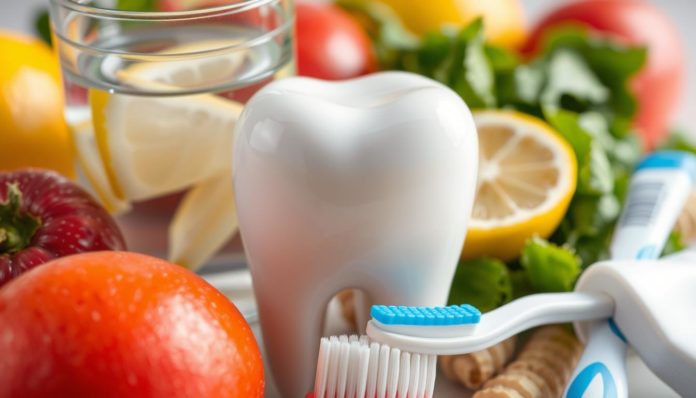About 35% of adults in the U.S. face tooth enamel erosion. This issue can seriously affect your oral health. Keeping tooth enamel strong is key for oral health that lasts. We’ll explore how to reduce enamel erosion and share tips to keep your smile shining and healthy.
First, it’s crucial to understand tooth enamel and its importance. Knowing what causes erosion is the first step to protection. By learning about these, you can better safeguard your enamel for a healthy mouth.
What is Tooth Enamel Erosion?
Enamel erosion means the outer layer of your tooth wears away. This makes your teeth weaker, more likely to get cavities, and sensitive. To understand it, we look at what your teeth are made of. We also see how important enamel is for keeping your teeth healthy.

Definition and Structure
Your teeth have several layers. Enamel is the hardest and has the most minerals. It acts like a strong shell. It protects your teeth from damage every day. But, acids from what you eat and drink can break it down. This can show the softer part underneath called dentin. Dentin gets harmed more easily.
How Enamel Protects Your Teeth
Enamel’s main job is to keep the inner parts of your teeth safe from damage. Without it, you’d get more cavities and your teeth would be sensitive. Taking care of your teeth and knowing what hurts enamel are key. They help you keep your teeth strong for your whole life.
Enamel Erosion Causes
Tooth enamel is the hardest substance in our bodies. However, it can still wear away. Knowing what causes enamel erosion can help you keep your teeth protected.
Dietary Choices
The foods and drinks you choose impact your enamel’s health. A diet high in acidic items can hurt your enamel. It’s important to be careful with what you eat and drink to keep your teeth strong.
Acidic Foods and Beverages
Things like citrus fruits, soda, and wine are tough on enamel. They raise acid levels in your mouth, weakening enamel over time. Eating or drinking them often can make erosion worse, damaging your teeth’s outer layer.

Environmental Factors
Several environmental factors also affect enamel health. Dry mouth, low saliva, and some medicines can make erosion worse. Identifying and managing these factors is key to protecting your enamel.
- Dry Mouth: Less saliva flow means your mouth can’t neutralize acids well. This makes erosion more likely.
- Acid Reflux: This condition brings stomach acids to your mouth, wearing away enamel.
- Medications: Drugs like antihistamines and aspirin may cause dry mouth and increase acidity.
Signs of Tooth Enamel Erosion
Finding enamel erosion early is key for keeping teeth healthy. There are signs to watch for so you can act fast. Addressing it early keeps problems from getting worse.
Sensitivity
Tooth sensitivity is often the first clue of enamel loss. Sharp pain with hot, cold, or sweet foods means your enamel might be thinning. This is a sign that your teeth’s protective layer is getting weak.
Discoloration
Enamel erosion makes teeth look yellow because the dentin below shows through more. This yellowing is a clear sign, making people want enamel erosion treatment. They seek treatment to get their teeth’s natural color back.
Transparency and Cracks
Teeth looking transparent at the edges could mean enamel loss. Also, cracks or dents are signs too. These, along with tooth sensitivity, show it’s time to act to avoid more damage.
How to Protect Tooth Enamel
Keeping your tooth enamel strong and healthy needs a commitment to great oral habits and some changes in your daily life. In this guide, we’ll show you how to protect your enamel. This ensures your smile stays bright and healthy.
Good Oral Hygiene Practices
Good oral hygiene is crucial for protecting your enamel. Brush your teeth at least twice daily and floss once. Also, don’t forget to use mouthwash. This helps get rid of plaque and bits of food that can harm your enamel. Pick a soft-bristled toothbrush to keep the enamel safe from scratches.
Using Fluoride Toothpaste
Fluoride toothpaste benefits your enamel in a big way. It helps make your enamel stronger against the acids from bacteria and food. Check your toothpaste for fluoride. And brush for a full two minutes for the best effect.
Regular Dental Check-ups
Going to the dentist regularly is key for enamel protection. The dentist can spot early signs of enamel wear. They also do professional cleanings to remove tough plaque. Plus, they can put fluoride or sealants on your teeth to make the enamel stronger.
| Routine | Benefits |
|---|---|
| Twice-daily brushing | Removes plaque and protects enamel |
| Using fluoride toothpaste | Strengthens and rebuilds enamel |
| Regular dental visits | Early detection of erosion and professional cleanings |
By adding these steps to your daily life, you can make your enamel much stronger. And keep your smile looking good. Just remember, being steady and using the right methods are the secrets to success.
Enamel Erosion: Prevention Tips
Keeping your enamel strong is key for healthy teeth. You can make a big difference just by following some easy tips. Start with cutting down on snacking. Eating too often, especially foods high in acid or sugar, softens your enamel for a bit. This softening happens every time you snack, so snacking less gives your enamel a break. It lets your saliva do its job and fix the enamel.
Drinking acidic drinks like soda or citrus juice? Use a straw. A straw puts the acid away from your teeth, which protects your enamel. Also, drinking water after acidic beverages helps wash away acids. This keeps your teeth safer.
Wait a while before brushing your teeth after having acidic foods or drinks. About 30 minutes should do. Brushing right away can spread the acids, hurting your enamel even more. Following these dental health tips regularly will keep your enamel strong and healthy.
Here are more tips to keep your enamel safe:
- Choose drinks and foods with less sugar to lower acid in your mouth.
- Drinking fizz-free drinks is better since fizzy drinks are usually acidic.
- Never use your teeth to open things or chew on hard objects. It might chip your enamel.
These tips for preventing enamel erosion are simple to follow. They greatly improve your oral health with minimal effort. A great place for more info is this comprehensive guide on tooth enamel erosion.
Here’s a quick recap of key practices to protect your enamel:
| Prevention Tip | Benefit |
|---|---|
| Minimize Snack Times | Reduces acid exposure and allows enamel recovery |
| Use a Straw for Acidic Drinks | Lowers direct acid contact with teeth |
| Wait Before Brushing | Prevents further enamel damage |
| Opt for Low-Sugar Drinks | Decreases total acid production in the mouth |
Following these tips can really help fight against enamel erosion. This way, you keep your dental health in check.
The Role of Diet in Preventing Enamel Erosion
Eating right is key to dental health. Good and bad foods affect your tooth enamel’s strength.
Foods to Avoid
Some foods and drinks can harm your enamel. Stay away from sugary snacks, fizzy drinks, and acidic fruits like oranges. Over time, these can wear down your enamel. For more on diet and enamel erosion, check this study.
- Sugary snacks
- Carbonated drinks
- Acidic fruits
Beneficial Foods for Strong Enamel
You should eat foods that protect your enamel. Dairy items like milk, cheese, and yogurt are full of calcium. They help a lot. You should also eat leafy greens, nuts, and fish with bones. These can rebuild and strengthen your enamel.
- Dairy products (milk, cheese, yogurt)
- Leafy greens
- Nuts
- Fish with bones (like sardines)
| Food Type | Avoid | Beneficial |
|---|---|---|
| Sugary snacks | Yes | No |
| Carbonated drinks | Yes | No |
| Dairy products | No | Yes |
| Leafy greens | No | Yes |
A balanced diet helps prevent enamel erosion. Healthy eating and fluoride can make your teeth strong. Remember, your diet plays a big part in keeping your enamel tough.
Enamel Erosion Treatment
Treating enamel erosion depends on how bad it is. Knowing what can be done helps fix and better the mouth’s health.
Professional Treatments
In bad cases, you may need dentists’ help. Options like bonding, crowns, and veneers are there to fix and shield teeth. Bonding puts a tooth-like material where needed. Crowns and veneers act as a strong cover, stopping more damage.
Over-the-Counter Solutions
You can also find help with products from the store. Things like toothpaste and mouthwashes make enamel stronger and less sensitive. While not as strong as dentist’s methods, they’re good for keeping the problem from getting worse.
Home Remedies for Tooth Enamel Care
Keeping your enamel healthy with home remedies is smart and natural. Adding these habits to your daily life boosts your oral care. They even stop enamel from wearing away.
Natural Remedies
Natural remedies are key to keeping tooth enamel strong. Home treatments like baking soda can clean and protect your teeth. Also, pastes with calcium and phosphate strengthen enamel.
- Baking Soda: Just mix a bit with water, brush gently for a natural shine.
- Coconut Oil Pulling: Swishing coconut oil fights off bad mouth bacteria.
- Egg Shell Toothpaste: Powdered egg shells boost enamel with calcium.
Preventive Measures
Preventing damage is essential in caring for your teeth naturally. It’s not just about fixing but keeping problems from starting.
- Sugar-Free Chewing Gum: Chewing gum increases saliva, which lowers acid levels in your mouth.
- Increased Water Intake: Drinking more water cleans your mouth and cuts down on acid.
- Dietary Adjustments: Eating fewer sugary foods and acidic drinks protects against enamel loss.
Using these home remedies for tooth enamel helps a lot. You’re doing something great for your enamel’s health. This support adds to the care from your dentist. Pick these easy, powerful steps for a healthy mouth.
Consult Your Dentist for Enamel Health
Good oral hygiene and smart eating are key. But knowing when to seek expert help is vital. A dentist can spot early signs of enamel wear. They offer advice that’s just right for you.
At check-ups, your dentist checks your enamel’s health. They might treat it to prevent damage. This advice is tailored to your needs. Regular visits help keep your enamel strong over time.
Seeing a dentist for enamel care is essential. Routine visits and expert advice keep your smile bright and sturdy. Talk to your dentist about any worries. Stay up-to-date on the best enamel care practices.
FAQ
What is tooth enamel erosion?
Tooth enamel erosion is when the tooth’s hard outer layer wears away. This layer, the enamel, is very strong. It protects the top of the tooth. Erosion can cause more sensitivity and decay.
How does tooth enamel protect your teeth?
Tooth enamel acts like a shield for your teeth. It keeps them strong and healthy. Without enamel, teeth can decay and feel sensitive because the layer beneath gets exposed.
What causes enamel erosion?
Eating lots of acidic foods and drinks, like oranges and wine, can cause erosion. Other factors include stomach acid exposure and some lifestyle habits.
What are some signs of enamel erosion?
Signs include teeth getting more sensitive to hot and cold or sweets, turning yellow, and looking transparent. You might also see cracks and cupping. These signs mean the enamel is getting thinner. It’s important to take care of it.
How can I protect tooth enamel?
To protect enamel, brush regularly with fluoride toothpaste and floss. Don’t forget dental check-ups. Also, try to eat fewer acidic foods and drinks.
What are some effective enamel erosion prevention tips?
To prevent enamel loss, limit snacks and use a straw for acidic drinks. Also, wait a bit before brushing after eating or drinking acidic things. These steps can make a big difference.
How does diet impact enamel health?
Diet affects enamel a lot. Sugary and acidic foods can hurt it. Foods high in calcium can make it stronger. Eating less acidic stuff and more calcium-rich foods is good for enamel.
What treatments are available for enamel erosion?
Treatments depend on how bad the erosion is. Options include bonding, crowns, or veneers from a dentist. There are also over-the-counter products. But it’s best to see a dentist for serious cases.
Are there any home remedies for tooth enamel care?
Yes, home remedies include using baking soda or remineralizing pastes. Chewing sugar-free gum and drinking more water can also help. These steps can protect enamel.
When should I consult my dentist about enamel concerns?
You should see your dentist for regular check-ups and if you notice signs of enamel erosion. Things like more sensitivity or discoloration are signs to look out for. Catching it early means better treatment.


